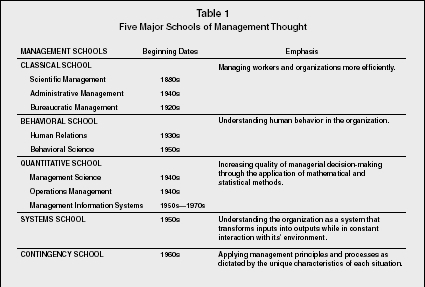major schools of management theories
Major Schools of Management Theories
There are several foundational schools of thought in management theory, each offering unique insights into organizational behavior, decision-making, and leadership practices. Here’s a summary of the major schools of management theories, along with links for further reading.
1. Classical Management Theory
This school focuses on optimizing efficiency and productivity within organizations. It comprises two main branches:
- Scientific Management: Developed by Frederick Taylor, this approach emphasizes time studies, standardization, and the scientific selection of workers to improve labor productivity.
- Administrative Management: Proposed by Henri Fayol, this theory outlines general principles of management, such as planning, organizing, leading, and controlling.
For more details, see CliffsNotes: Classical Schools of Management and Business.com: A Guide to Popular Management Theories.
2. Behavioral Management Theory
Also known as the Human Relations Movement, this school emerged as a response to classical management. It emphasizes the importance of human behavior, motivation, and interpersonal relationships in the workplace. Key figures include Elton Mayo, whose Hawthorne Studies demonstrated that employee satisfaction can lead to increased productivity.
You can explore more about this school on Economics Discussion: Schools of Management Thought.
3. Quantitative Management Theory
This school applies mathematical and statistical methods to management decision-making. It helps organizations in optimizing processes and resource allocation, often utilizing operations research and quantitative techniques.
Further information is available in Study.com: Management Theories.
4. Systems Theory
Systems theory views organizations as systems composed of interrelated parts. This perspective emphasizes the need for a holistic approach to management, recognizing how changes in one part of the organization can affect the whole system.
You can read more about this theory in the context of management on ResearchGate: Schools of Management Thought.
5. Contingency Theory
This theory posits that there is no one-size-fits-all management approach and that management strategies should be contingent upon the organizational context. It emphasizes flexibility and the ability to adapt to changing circumstances.
For a deeper understanding of contingency theory, see MAAW Accounting Archive: The Management Theory Jungle.
6. Decision Theory
This school focuses on the processes and techniques managers use to make informed decisions. It incorporates elements from behavioral, systems, and contingency theories to improve decision-making in uncertain environments.
More insights about decision-making theories can be found on Business.com.
Conclusion
These schools of management theories provide a framework for understanding different approaches to management. By exploring each theory, managers can gain valuable insights that help improve their practices, adapt to changing environments, and enhance organizational effectiveness. For comprehensive resources on these theories, you can refer to the aforementioned links.
Sources


Related Questions
Work fast from anywhere
Stay up to date and move work forward with BrutusAI on macOS/iOS/web & android. Download the app today.
